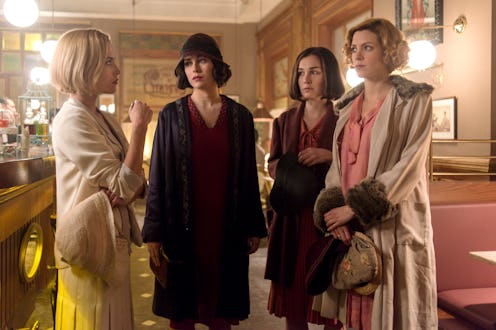Entertainment
'Cable Girls' Has More Empowering Stories To Tell

In the first half of Season 1, fans of Netflix's Cable Girls watched as Lidia, Carlota, Marga, and Ángeles struggle to navigate their independence within a glamorously dark 1920's Madrid. While Cable Girls has been renewed for Season 2 according to Deadline, the second half of Season 1 has yet to air. While Netflix has not set an official date for either the second half of Season 1 or the premiere of Season 2, based on a similar schedule to its other piecemeal series The Get Down, audiences could expect the rest of Season 2 to arrive in fall of 2017 and a possible release of Season 2 by next year.
The first part of Season 1 premiered April 28 and featured eight chapters, or capítulos, each focusing on a complicated life issue for each of the women. Between its soapy and scandalous storylines and its beautifully, well-crafted relationships between its four female characters, Cable Girls has managed to combine modern day themes and fads with a 1920s vibe. The women are portrayed as being ahead of their time and, when coupled with a modern day soundtrack that features Demi Lovato, Kaliyo, and Lana Del Rey, Cable Girls highlights its message of empowerment while reminding viewers that women are still struggling with these very same issues.
In an interview with The Hollywood Reporter, showrunner Teresa Fernandez-Valdes addressed the show’s feminist contribution to the Netflix roster. "What I think we can offer Netflix is a story that is mainly directed at women," she said. "Although it isn't just the female audience we are targeting, but women, strong women, are the protagonists of the series."
The first part of Season 1 includes blackmail, infidelity, abuse, ambition, and loyalty, but at its core the show is about equality for the four main protagonists. Lidia yearns for freedom and is often called upon to help other women, like Ángeles, to do the same. Meanwhile, Ángeles is trying to "have it all," since she struggles to keep her family intact as she makes her career a priority. Marga receives quite a culture shock when she moves to the big city, but she is still trying to gain the freedom that her family wants so badly for her. Meanwhile, Carlota is experimenting with finding love in a polyamorous relationship despite the social norms that are trying to force her into more traditional roles.
The thematic content of the series can be placed in any time period, any country, and any situation. What makes Cable Girls a compelling, feminist series is how it uses the bonds of sisterhood as a driving force. As the women seek to empower themselves, they find this empowerment by helping each other.
Adding to this empowerment is the job of a cable girl, which allows the women financial independence and a chance to explore an ever-changing world. Height is a hiring factor (in the series, Lidia proves this theory wrong), and the women are made to practice elocution to project a particular "image" for the company (something Carlos insists upon). The show highlights many of the professional issues that women were facing at this time, not just in Spain, but in the United States as well.
According to the Engineering And Technology History Wiki, "For much of the 20th century, women played an important role in telecommunications system of the United States." In these telecommunications offices, women worked in small spaces, thus navigating financial independence and learning work and life skills together. Elements of this navigation serve as powerful narrative forces in Season 1.
With the second half of the season arriving later this year, fans can only hope Cable Girls continues to stay true this message of feminine independence and agency. The introduction of rotary technology in Episode 8 indicates that the the changing world and its expectations will have a very prominent role in closing out Season 1 and leading into Season 2.
The creator of Cable Girls has not announced any possible plot points for Season 2, but the fight for independence waged by Lidia, Carlota, Marga, and Ángeles are far from over.